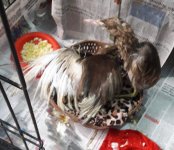Good evening!
I have recently been fostering 2 baby egrets (I think they are egrets. not sure) who were found on the road. I was planning on releasing them in the wild once they grew up. But now they both seemed to have developed splay legs issue. They also have weird yellowish poop which I've heard is a sign of sickness and never seen before in a bird. They generally have green or brown poop.
They eat eggs and fish and are drinking water just fine.
I have started to give them supplements for the past 5 days as suggested (Vitamin D3 with calcium and cod liver fish oil) to me. That did bring some improvement but the two aren't moving.
Their legs aren't paralysed that much I've checked. They move around and change position. But movement is difficult for them because their legs are very weak. They collapsed with their legs jutting out completely backwards.
I'm stumped as to what to do and very worried.

I have recently been fostering 2 baby egrets (I think they are egrets. not sure) who were found on the road. I was planning on releasing them in the wild once they grew up. But now they both seemed to have developed splay legs issue. They also have weird yellowish poop which I've heard is a sign of sickness and never seen before in a bird. They generally have green or brown poop.
They eat eggs and fish and are drinking water just fine.
I have started to give them supplements for the past 5 days as suggested (Vitamin D3 with calcium and cod liver fish oil) to me. That did bring some improvement but the two aren't moving.
Their legs aren't paralysed that much I've checked. They move around and change position. But movement is difficult for them because their legs are very weak. They collapsed with their legs jutting out completely backwards.
I'm stumped as to what to do and very worried.







